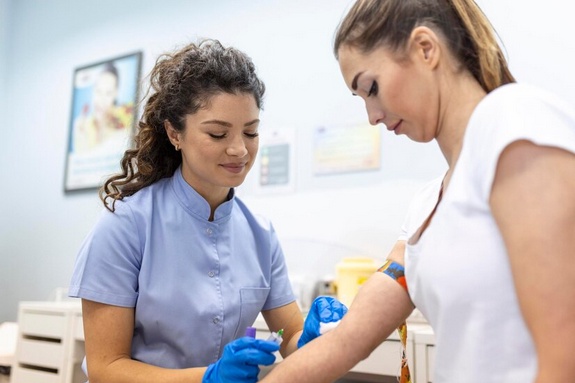Introduction
In the dynamic landscape of healthcare, phlebotomists play a crucial role as skilled professionals responsible for the collection of blood specimens. Aspiring individuals eager to embark on a fulfilling career in phlebotomy often seek comprehensive training courses to acquire the necessary skills and knowledge. In this guide, we will unveil the top phlebotomist training courses, exploring the key components that make them stand out and explaining how they pave the way to success in this vital healthcare profession.
Understanding Phlebotomist Training Courses
Phlebotomist training courses are designed to equip individuals with the essential skills and knowledge needed to perform blood collection procedures accurately and safely. These courses typically include a combination of classroom education, hands-on practical experience, and clinical placements. As the demand for skilled phlebotomists continues to grow, the importance of choosing the right training course becomes paramount in shaping a successful career in this field.
Key Components of Top Phlebotomist Training Courses
-
Comprehensive Classroom Education: The foundation of any top phlebotomist training course lies in its comprehensive classroom education. This includes in-depth learning about the anatomy and physiology of the circulatory system, blood composition, and the various techniques used in phlebotomy. A solid theoretical understanding is crucial for success in the practical aspects of blood collection.
-
Hands-On Practical Experience: The best training courses emphasize hands-on practical experience to ensure that students develop the necessary skills required for venipuncture and skin puncture techniques. This hands-on training is often conducted in well-equipped simulation labs, allowing students to practice under the guidance of experienced instructors.
-
Clinical Placements: Exposure to real-world clinical settings is a key component of top phlebotomist training courses. Clinical placements provide students with the opportunity to apply their knowledge and skills in a supervised environment, working with actual patients. This practical exposure is invaluable in building confidence and readiness for the challenges of the profession.
-
In-Depth Infection Control Training: Given the importance of maintaining a sterile environment in phlebotomy, top training courses prioritize in-depth infection control training. Students learn about proper hygiene practices, the use of personal protective equipment, and strategies to minimize the risk of complications during blood collection procedures.
-
Communication and Interpersonal Skills Development: Effective communication and interpersonal skills are critical for phlebotomists. Leading training courses focus on developing these skills, teaching students how to interact with patients, address their concerns, and ensure a positive experience during blood collection. Building trust and rapport is essential for successful phlebotomy practice.
-
Ethical and Professional Conduct: Top phlebotomy training courses instill a strong sense of ethics and professionalism in their students. This includes understanding the importance of patient confidentiality, respecting cultural diversity, and adhering to ethical standards in healthcare. Training in ethical conduct ensures that phlebotomists maintain the highest standards of practice.
Top Phlebotomist Training Courses Unveiled
-
American Society for Clinical Pathology (ASCP) Phlebotomy Training Program: The ASCP offers a comprehensive phlebotomy training program that covers all aspects of blood collection. With a blend of online learning, hands-on practical sessions, and clinical placements, this program is designed to prepare individuals for the ASCP Board of Certification Exam.
-
National Healthcareer Association (NHA) Phlebotomy Technician Certification Program: NHA's Phlebotomy Technician Certification Program is renowned for its thorough curriculum and emphasis on practical skills. It includes both online coursework and a hands-on clinical externship, providing a well-rounded training experience.
-
National Phlebotomy Association (NPA) Training Courses: NPA offers a range of phlebotomy training courses that cater to different levels of expertise. From basic courses for beginners to advanced programs for experienced phlebotomists, NPA's training options are tailored to meet the diverse needs of individuals in the field.
Benefits of Top Phlebotomist Training Courses
-
High Employability: Completing a top-notch phlebotomy training course enhances employability. Employers value graduates from reputable programs, knowing that they possess the necessary skills and knowledge to excel in the field. This, in turn, opens up a wide range of job opportunities in hospitals, clinics, laboratories, and other healthcare settings.
-
Confidence and Competence: The comprehensive nature of top phlebotomy training courses instills confidence and competence in graduates. Armed with a strong theoretical foundation and extensive practical experience, phlebotomists feel well-prepared to handle the challenges of blood collection in real-world scenarios.
-
Recognition and Certification: Graduates from recognized training programs often receive certifications from accrediting bodies such as ASCP, NHA, or NPA. These certifications are widely recognized in the healthcare industry and serve as a testament to the individual's expertise and commitment to professional standards.
-
Continuous Professional Development Opportunities: Many top phlebotomy training courses provide opportunities for continuous professional development. This may include advanced courses, workshops, or specialized training to keep phlebotomists updated on the latest advancements in the field, ensuring they remain at the forefront of their profession.
-
Networking Opportunities: Training courses often facilitate networking opportunities, allowing students to connect with experienced professionals, instructors, and fellow students. Networking can be valuable for career advancement, providing insights, mentorship, and potential job opportunities within the healthcare community.
Conclusion
Embarking on a career in phlebotomy requires not only passion but also the right education and training. Top phlebotomist training courses, characterized by comprehensive education, hands-on experience, and a focus on professionalism, pave the way to success in this vital healthcare profession. Graduates emerge not only with the technical skills needed for blood collection but also with the confidence, competence, and ethical foundation essential for a rewarding career in phlebotomy.
Choosing a reputable training course is an investment in one's professional future. The benefits extend beyond securing employment; they encompass personal growth, recognition, and the opportunity to make a meaningful impact in the field of healthcare. Aspiring phlebotomists are encouraged to explore and choose training courses that align with their goals, setting the stage for a fulfilling and successful journey in the dynamic and essential world of phlebotomy.


No comments yet